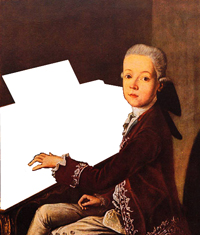Technology, The Movie
[Translations: Japanese]
Even person is born a star. Every person develops a unique combination of latent abilities, nascent insights and potential experiences that no one else shares. Even twins — who share a common DNA — don’t share the same life potential.
When a person maximizes their set of talents, they shine because no one can do what they do. They are inimitable, and that is what we prize about them. Indeed that is what we mean by a star. That doesn’t mean that everyone will sing on Broadway, or play in the Olympics, or win a Nobel prize. Those are merely three well-worn ways of being a star, and by deliberate design those particular opportunities are limited, but we’ve wrongly fixed them as the destiny for anyone successful. In fact, those positions of prominence and stardom are prisons, straightjackets of how someone else excelled. Celebrities inspire legions of others trying to clone their success. Their fans are trying to star in someone else’s movie. Not surprisingly they usually flop.
You can read a thousand biographies and what you’ll learn is that it takes most people most of their life to find out what their movie is. It is much easier to put ourselves into someone else’s movie – especially if they are having a good time. It’s a lot of fun to become yourself. Accomplished people are very attractive because they have found a unique way to be themselves. Why not just cut this path short and imitate the person who is having fun? In the meantime your own movie stalls. The real scary temptation comes when the person being imitated is truly admirable and great. The inevitable collision of ambition and dishonesty in these wannabe cases is very sad. When you are the star in your own movie, you won’t look like anyone else.
Although being the star in your own movie is the easiest thing in the world – and being easy is a good indicator you are in the right movie — finding your movie is extremely hard work. It cannot be done alone. It’s a very rare person who can realistically assess and nurture their talents without the feedback and outside view of others. That includes both friends and enemies. In a real sense, this is what others are for. But if you listen to others too much, you’ll get roped into their movie, and they’ll be all too happy to have you play an extra.
There’s another hurdle. Sometimes our talents are similar to people close to us – parents and siblings – and it takes great discernment to perceive ourselves independent of them. Do we really have that trait we saw in our father or mother? We have to test, try out, examine, probe, and experiment with that perceived trait to see if it is indeed ours. That testing is called life.
But the real difficulty in finding our movie is that we can only find it by creating it. Our movie doesn’t exist out there, hidden in a folder. We have to make the movie that we star in. We make it up! And most difficult of all, we have to write the script before we know how our story ends. Worse, all the people who are extras in our movie are the leading stars in their own movies (or should be)! So it gets very complicated fast. My life is your stage set, and as I grow, I’m re-arranging the props in your movie. No wonder it is so hard to keep our roles straight. But this great interdependency is a blessing. This intersection of lives is where we get our best lines, our character, our very story.
We are not born with the particular set of talents we spend our lives developing. They are not wound into our DNA like proteins. They are not fixed. We certainly are born with limited and varying abilities. We start out different. Some have easier starts than others. Where and when you were born, and the parents you have, are givens with drastic influence over your life.
Yet those foundational inherent attributes do not contain our destiny. The qualities we become are not fully present at our birth. We grow them, or grow into them. They stem from our creative nature. They arise from us, just as a story might. Indeed, our lives are the story we tell ourselves in order to find out who we are. As we make our story up, we have the chance to create new responses for our character, new ideas, a new abilities in response to the changing background, staged by other people. This creative force reveals itself in many details. For instance, in 1954 Roger Bannister’s gutsy achievement in breaking the four-minute mile altered the landscape of athletic possibilities so that hundreds of thousands of runners after him found the ability to do what had been unthinkable before. Picasso’s insights into cubism opened up a huge territory of artistic talent not visible before (you didn’t have to draw to be an artist!). The imagination of a genius like Einstein unleashed previously unimagined abilities of humans to think in, say, multiple dimensions, or relativity. The right friends can do the same in stretching us. One person’s imagination can actually alter the internal potential of another person. (The reverse is also true: one person’s evil can destroy the potential of another.)
There’s always been a curious paradox to life. To reach our final potential, our life has to be lived till the end, but the very process of living changes everything, including the potential. That recursive nature is unsettling, but is actually the source of everything we like about life. If embodiment lacked this dynamic loop, it would be a mere simulation, a flat theory, a tired movie whose end we could see coming. As it is, it is full of surprises – that we in part write ourselves.
We surprise both individually and collectively. Over time the possibilities we create in society for others continue to open up the possibilities within others. We don’t normally think of opportunities this way, but theses possibilities are called “technology.” The technology of vibrating strings opened up (created) the potential for a virtuoso violin player. The technology of oil paint and canvas unleashed the talents of painters through the centuries. The technology of film created cinematic talents. The soft technologies of writing itself, or law making, and mathematics, all expanded our potential to create and do good. We – collectively as friends, family, clan, nation and society – have a direct role in enabling each person to be a star – to maximize their unique contribution.

However if we fail to enlarge the possibilities for others, we diminish them, and that is a sin. Enlarging the scope of creativity for others, then, is an obligation. Can you imagine how poor our world would be if Bach had been born before the technologies of the piano? Or if Vincent van Gogh had arrived before we invented oil paint? Or if no one had developed film technology before Hitchcock grew up? Yet today there are children – including mine — whose potential may be thwarted because the ideal technology for their talents has yet to be invented. Perhaps there is a tiny device needed before the Shakespeare of our time can produce their masterworks. Without these manufactured possibilities, he/she is thwarted – and by dependency, all human creativity diminished. We thus have a moral obligation to increase technology. When we enlarge the varieties and reach of technology, we increase options, and when we expand possibilities, we open up the chance for everyone to be a star.



